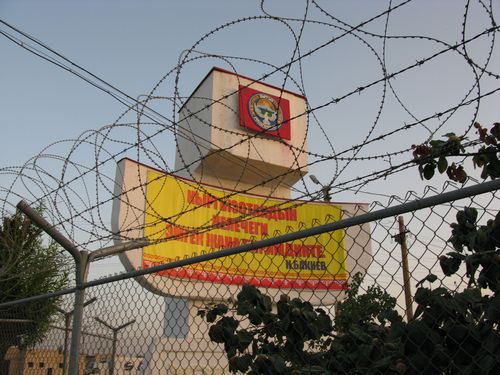
Central Asia’s Unresolved Bilateral Disputes as a Challenge to Fruitful Security Cooperation
Publication: Eurasia Daily Monitor Volume: 10 Issue: 143
By:

On July 23, a new border incident took place between two groups of border guards from Kyrgyzstan and Uzbekistan in the former’s Aksay district of Jalalabad province. According to Kyrgyzstan’s border protection service, the violent clash, which subsequently led to the death of two Uzbekistani nationals, was provoked by the latter’s refusal to leave Kyrgyzstani territory. After these had presumably opened fire on Kyrgyzstan’s border patrol following a brief verbal altercation, one of them was shot down on the spot, while the second suffered serious gun wounds and later died in a hospital. At the same time, several state-controlled Uzbek media outlets promptly blamed the Kyrgyz side for sparking the incident, referring to “drunken Kyrgyz soldiers” carrying out a pre-meditated attack against the neighboring country’s officials while staying on the wrong side of the border (Avesta News Agency, July 23).
Although both Bishkek and Tashkent quickly agreed to conduct in-depth investigations and to take preventive measures aimed at staving off further border tensions, neither side was ready to recognize its fault and to present official excuses. Following a July 24 bilateral meeting of the two countries’ representatives, Tokon Mamytov, Kyrgyzstan’s deputy prime minister in charge of defense, security and border issues, publicly admitted that the two capitals had failed to agree on a common reading of the facts. He also said that they would organize independent inquiries based on the diverging accounts of this latest incident (Vecherny Bishkek, July 24; Podrobno.uz, July 23).
Earlier on July 17, another incident occurred in the town of Uzgen located in Kyrgyzstan’s troubled Osh province, which had previously seen protracted periods of inter-ethnic violence triggered by anti-Uzbek pogroms two years ago. According to the official police report, a Kyrgyz police officer was attacked by a group of Uzbek youths after he had attempted to fine a local resident involved in a minor road accident. Faced with a growing crowd of over 200 people, municipal authorities decided to call in additional police forces, fearing the repetition of clashes between the two ethnic groups. However, the independent Fergana News Agency provided a different version of the incident, alluding to one more case of police abuse aimed against the Uzbek minority living southern Kyrgyzstan (Fergananews.com, July 18).
Whereas Kyrgyzstan’s relations with two of its neighbors, Tajikistan and Uzbekistan, remain tense, even neighboring Kazakhstan, whose territory lies outside of the unstable Ferghana Valley, has recently been confronted with unresolved border issues. On July 7, several hundred Kyrgyzstani nationals blocked an irrigation canal used in Kazakhstan’s Zhambyl province for agricultural purposes. As the Kyrgyz Republic’s Deputy Prime Minister Mamytov later acknowledged, they have been insisting on the renegotiation of the Kazakhstan-Kyrgyzstan border agreement ratified by both countries in 2008. At a time when Bishkek was struggling to normalize the situation in order to reassure its Kazakhstani partners, further demands emerged, such as the trial of 76 deputies of Kyrgyzstan’s parliament who had previously voted in favor of this accord (Tengrinews.kz, July 12).
However, the current disputes and divisions in the Central Asian republics’ bilateral relations are not only the heritage of their poorly demarcated borders but also the result of unfriendly state policies implemented by their respective leaderships. Uzbekistan and Tajikistan’s energy dispute is a particularly vivid illustration of this dangerous trend. On July 24, Tajikistan’s authorities officially admitted that the talks with their counterparts from Uzbekistan concerning the resumption of natural gas supplies for Tajikistan’s industrial sector had been a sheer failure. Uzbekistan suspended its gas supplies to its neighbor on the last day of 2012, without providing formal grounds for this unfriendly move. As a result of continuing gas shortages, Tajikistan’s leading enterprises, such as TajikCement and Talco, have already downsized their production plans, whereas TajikTransGas has had to lay off most of its employees, including the top managers (News.tj, July 24).
Both Kazakhstan and Uzbekistan view with suspicion Kyrgyzstan’s and Tajikistan’s desire to build medium- to high-capacity hydropower plants in order to boost their power generation capabilities and to satisfy their expanding industrial needs. The two latest meetings between Presidents Nursultan Nazarbayev and Islam Karimov, in September 2012 and June 2013, clearly demonstrated the commonality of their respective positions concerning the exploitation of Central Asia’s scarce water resources, especially with regard to the relative advantages enjoyed by the upstream Kyrgyzstan and Tajikistan. In this context, Moscow’s support of Bishkek’s Kambarata-1 hydropower plant?reconfirmed in early May 2013 by Russian President Vladimir Putin?only adds to the existing controversy (Newskaz.ru, July 18; Rbc.ru, May 8; Fergananews.com, September 7, 2012).
While the inability of Central Asian governments to engage in productive political and economic cooperation casts further doubt over the future of regional integration, mutual distrust and a lack of substantive dialogue are especially harmful to their joint capacity to cope with shared security concerns. With International Security Assistance Force (ISAF) militaries already preparing to leave Afghanistan in 2014, the security situation in Central Asia has been increasingly viewed with much apprehension. In his June 2013 interview for a Qatari news agency, Russian Foreign Minister Sergei Lavrov openly spoke about the security threat posed by Afghan radicals of Uzbek and Tajik origin suspected of planning coordinated attacks against Central Asian police and armed forces in the wake of the 2014 withdrawal. This declaration comes at a time when Kazakhstan, Kyrgyzstan and Tajikistan have all noted increased activity by several extremist organizations, such as Hizb ut-Tahrir and Jamaat Ansarullah, on their respective territories (News.tj, June 19).
Despite Russia’s and China’s intentions to step up cross-border security cooperation within the Shanghai Cooperation Organization (detailed proposals are currently expected at the forthcoming SCO summit in Kyrgyzstan on September 17), the prospects for such cooperation are already being undermined by the persistence of many dividing lines in Central Asia’s regional landscape.




